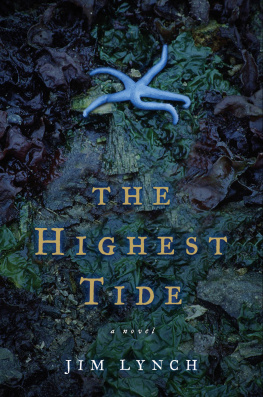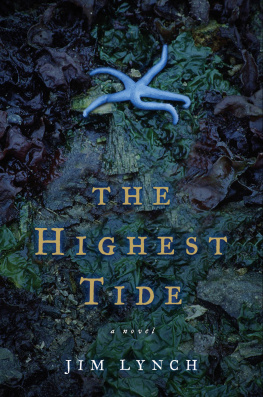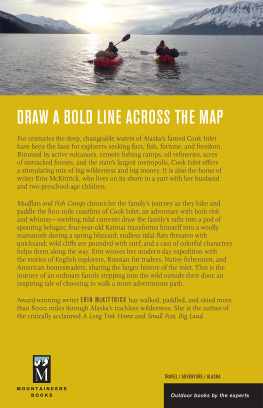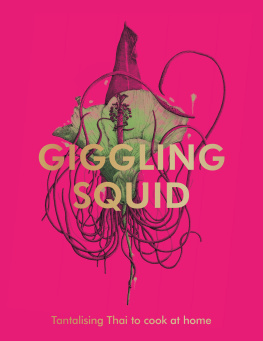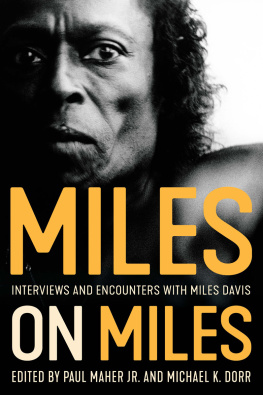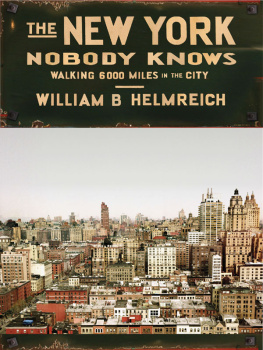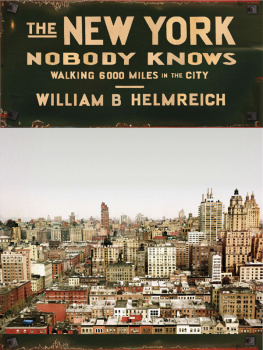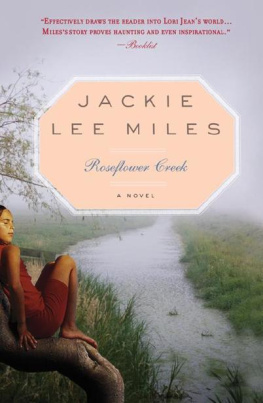THE
HIGHEST
TIDE
a novel
JIM LYNCH
BLOOMSBURY
For Denise
Table of Contents
I LEARN ED EARLY ON that if you tell people what you see at low tide theyll think youre exaggerating or lying when youre actually just explaining strange and wonderful things as clearly as you can. Most of the time I understated what I saw because I couldnt find words powerful enough, but thats the nature of marine life and the inland bays I grew up on. Youd have to be a scientist, a poet and a comedian to hope to describe it all accurately, and even then youd often fall short. The truth is I sometimes lied about where or when I saw things, but take that little misdirection away and I saw everything I said I saw and more.
Most people realize the sea covers two thirds of the planet, but few take the time to understand even a gallon of it. Watch what happens when you try to explain something as basic as the tides, that the suction of the moon and the sun creates a bulge across the ocean that turns into a slow and sneaky yet massive wave that covers our salty beaches twice a day. People look at you as if youre making it up as you go. Plus, tides arent news. They dont crash like floods or exit like rivers. They operate beyond the fringe of most attention spans. Anyone can tell you where the sun is, but ask where the tides are, and only fishermen, oystermen and deep-keeled sailors will know without looking. I grew up hearing seemingly intelligent grown-ups say what a beautiful lake, no matter how many times we politely educated them it was a bay, a briny backwater connected to the worlds largest ocean. Wed point to charts that showed the Strait of Juan de Fuca inhaling the Pacific all the way down to our shallow, muddy bays at the southern end of Puget Sound. It still wouldnt stick. It was the same way with beach scavengers. There was no way to make them understand they were tromping across the roofs of clam condos. Most people dont want to invest a moment contemplating something like that unless they happen to stroll low tide alone at night with a flashlight and watch life bubble, skitter and spit in the shallows. Then theyll have a hard time not thinking about the beginnings of life itself and of an earth without pavement, plastic or Man.
People usually take decades to sort out their view of the universe, if they bother to sort at all. I did my sorting during one freakish summer in which I was ambushed by science, fame and suggestions of the divine. You may recall hearing pieces of it, or seeing that photo of me looking like some bloodshot orphan on the mudflats. Maybe you remember the ridiculous headline USA Today pinned on me after that crazy cult took an interest: KID MESSIAH? You could have seen the same article recycled in the London Times or the Bangkok Post. Then again, you might have been among the hundreds of rubber-neckers who traveled to our bay to see things for yourself.
Part of the fuss had to be my appearance. I was a pink-skinned, four-foot-eight, seventy-eight-pound soprano. I came off as an innocent nine-year-old even though I was an increasingly horny, speed-reading thirteen-year-old insomniac. Blame Rachel Carson for the insomnia. She was long dead by the time I arrived but I couldnt resist reading her books over and over. I even read The Sea Around Us aloud to make it stick.
There is no drop of water in the ocean, not even in the deepest parts of the abyss, that does not know and respond to the mysterious forces that create the tide.
How do you read that sentence, yawn and turn out the lights?
My family lived in a tiny, metal-roofed house on the soggy, fog-draped bottom of the Sound where the Pacific Ocean came to relax. Farther north, glassy dream homes loomed on rocky bluffs above the splash, but once you reached Olympias bays the rocks crumbled to gravel, the beige bluffs flattened to green fields and the shore side mansions turned into remodeled summer cabins.
The front half of our house stood on stout pilings that got soaked during the few extreme tides each year. Behind the house was a detached garage, over which I lived in a makeshift storage room with a closet toilet like youd find in a sailboat. The best thing about my room was that its low, slanted ceilings kept the adults away, and its back stairway allowed me to step unnoticed into nights like the one that set the summer of my life into motion.
I loaded up my kayak with a short shovel, a backpack and Ziploc sacks and paddled north out of Skookumchuck Bay around Penrose Point into Chatham Cove, a shallow, cedar-ringed half-circle of gravelly flats that sprawled before me like an enormous glistening disc. It was two-fifteen A.M., an hour before the lowest night tide of the summer with an albino moon so close and bright it seemed to give off heat. There was no wind, no voices, nothing but the occasional whir of wings, the squirts of clams and the faint hiss of retreating water draining through gravel. Mostly there were odorshe fishy composting reek of living, dead and dying kelp, sea lettuce, clams, crabs, sand dollars and starfish.
It was my first summer collecting marine specimens for money. I sold stars, snails, hermit crabs, and other tidal creatures to public aquariums. I also sold clams to an Olympia restaurant and assorted sea life to a private aquarium dealer who made my throat tighten every time he pulled up in his baby-blue El Camino. Almost everything had a market, I was discovering, and collecting under a bright moon was when I often made my best haul, which worsened my insomnia and complicated my stories because I wasnt allowed on the flats after dusk. The other part of it was that you see less and more at night. You also see things that turn out not to be real.
I walked the glimmering edge, headlamp bouncing, picking my way to avoid crushing sand dollars and clam shells facing the sky like tiny satellite dishes. I saw a purple ochre sea star, then fifteen more strewn higher on the beach, their five legs similarly cocked, pinwheeling in slow motion back toward the water. None of them were striking or unusual enough to sell to the aquariums. They wanted head-turners and exotics. Like anything else, people wanted to see beauties or freaks.
As I crossed the line where gravel yielded to sand and mud, I saw a massive moon snail, the great clam-killer himself, his undersized shell riding high on his body like the cab of a bulldozer, below which his mound of oozing flesh prowled the flats for any clam unlucky enough to be hiding in its path. Moon snails were often hard to find because they burrow deeply, feeding on clams, their tiny jagged tongues drilling peepholes right above the hinge that holds clams together. Then they inject a muscle relaxant that liquefies the clam to the point where it can be sucked out through the hole like a milkshake, which explains the sudden troves of empty shells with perfectly round holes in the exact same spot, as if someone had tried to string a necklace underground, or as if youd stumbled onto a crime scene in which an entire clam family had been executed gangland style.
A feisty entourage of purple shore crabs scurried alongside the snail, their oversized pinchers drawn like Uzis. I thought about grabbing the moon snail, but I knew that even after it squeezed inside its shell like some contortionist stunt, it would still hog too much room in my pack. So I noted where it was and moved on until I saw the blue flash. It wasnt truly flashing, but with moonlight bouncing off it that was the effect. I steadied my headlamp and closed in on a starfish that radiated blue, as if it had just been pulled from a kiln. But it wasnt just the color that jarred me. Its two lower legs clung strangely together in line with its top leg and perpendicular to its two side legs, making it stand out in the black mud like a blue crucifix.
Next page
